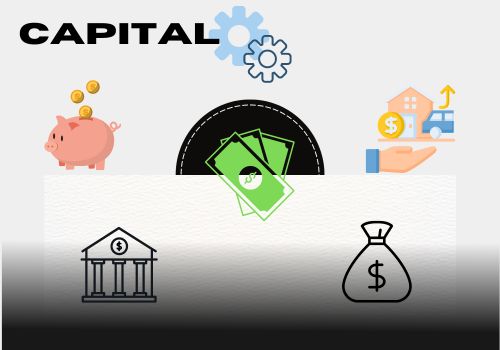Capital plays a central role in the economy as a key input in the production process and a driver of economic growth. It refers to the financial, physical, and human resources used in the production of goods and services. Capital can take various forms, including physical capital (such as machinery, buildings, and infrastructure), financial capital (such as money, stocks, and bonds), and human capital (the knowledge, skills, and abilities of individuals).
Physical capital is tangible assets used in production. It includes machinery, equipment, tools, buildings, and infrastructure that facilitate the production of goods and services. Physical capital contributes to increasing productivity and efficiency, enabling businesses to produce more output with fewer resources. Investments in physical capital are crucial for economic development, as they enhance the capacity to produce and create opportunities for employment and economic growth.
Financial capital refers to money and other financial instruments that are used to invest, purchase goods and services, and facilitate economic transactions. It includes savings, investments, stocks, bonds, and other financial assets. Financial capital is vital for businesses to acquire the necessary funds for production, expansion, and innovation. It also enables individuals to make purchases, invest in education, and accumulate wealth.
Human capital
refers to the knowledge, skills, and abilities possessed by individuals. It
represents the education, training, experience, and expertise that individuals
bring to the production process. Human capital is a critical driver of economic
growth and productivity. Investments in education, vocational training, and
skills development contribute to enhancing human capital, leading to improved
job prospects, higher wages, and increased innovation and productivity.
Capital
formation is the process of increasing the stock of capital in an economy over
time. It involves investments in physical capital, financial capital, and human
capital. Capital formation is essential for economic growth as it increases the
productive capacity of an economy and promotes technological advancement and
innovation. Governments, businesses, and individuals all play a role in capital
formation through investments, savings, and policies that promote education and
skill development.
Access to
capital is crucial for businesses and entrepreneurs. It enables them to start
new ventures, expand operations, and invest in research and development.
However, access to capital can be a challenge, particularly for small and
medium-sized enterprises (SMEs) and individuals with limited resources.
Financial institutions, government programs, and initiatives aimed at promoting
entrepreneurship and supporting SMEs play a crucial role in facilitating access
to capital.
Capital markets
are platforms where individuals, businesses, and governments raise funds
through the issuance of stocks, bonds, and other financial instruments. Capital
markets provide opportunities for investment, diversification of risk, and
allocation of capital to its most productive uses. Efficient capital markets
promote economic growth and facilitate the flow of funds from savers to
investors.
In conclusion, capital is a vital factor in the economy, encompassing physical, financial, and human resources. It contributes to economic growth, productivity, and innovation. Investments in physical capital, financial capital, and human capital are necessary for enhancing the productive capacity of an economy. Access to capital and efficient capital markets are critical for businesses and individuals to fund investments and facilitate economic development. Capital formation and policies that promote education and skills development are key drivers of economic growth and prosperity.


.jpg)